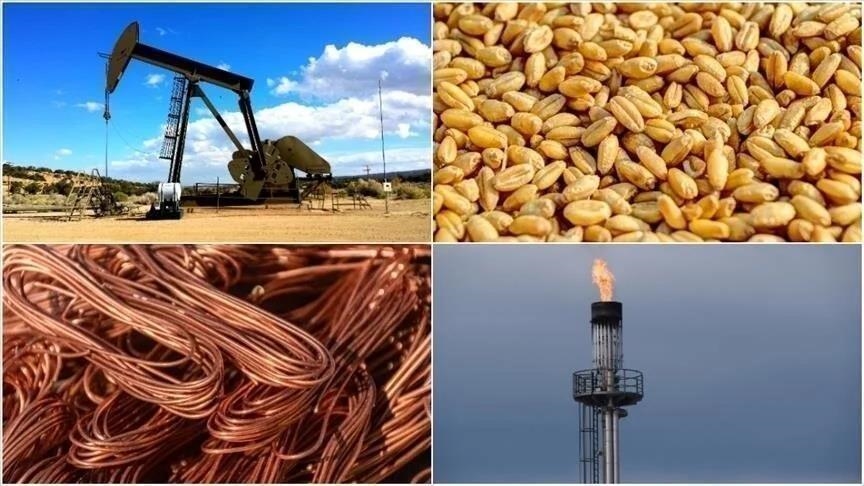ISTANBUL
Commodity prices were mixed on Christmas week, seeking direction amid political developments, while high-risk perception was prominent in the markets ahead of President-elect Donald Trump’s taking office and his promised tariff hikes on China.
The US 10-Year Futures bond saw its highest since May, rising to 4.26%, after the Fed showed signals that the rate cut cycle next year may be slower than expected. The US Dollar Index hovered close to its nearly 2-year high, rising to 108.3 last week and ending at 108.0.
Analysts say that geopolitical tensions and gold purchases by central banks will continue with Trump returning to office in January, while political uncertainty will persist.
Gold fell 0.3% per ounce as bonds rose and markets focused on Trump’s policy impact and the Fed’s future roadmap.
Silver and palladium declined 0.6% and 0.9%, respectively, while platinum climbed 0.6% per ounce last week.
Meanwhile, copper rose 0.8% as the Chinese government announced to reduce import tariffs on recycled copper and aluminum raw materials starting Jan. 1.
Chinese Minister of Finance said the decision is to boost high-quality product imports and expand domestic demand, as the China-Maldives Free Trade Agreement (FTA) enters into force on the first day of the new year.
The Legislative Assembly of El Salvador lifted the seven-year ban on metal mining on Monday. President Nayib Bukele supported the lifting of the ban to stimulate economic growth, while environmental groups criticized it.
Chile’s environmental regulator SMA had filed four charges against Anglo American-controlled Los Bronces copper mine for non-compliance with environmental permits, resulting in a fine of $17.2 million.
Chilean miner Cadelco applied for a permit to extend the operation duration of its Gabriela Mistral copper mine for over 25 years, with an investment of $800 million — the end of life of the mine is aimed to be extended from 2028 to 2055 and the use of local ground water will be ceased by 2035.
Aluminum rose by 0.8% and zinc 1.3%, while lead fell by 1.4% and nickel 1% last week.
As for the energy group, Brent crude oil ended the week on a 1% increase, rising to a record weekly increase due to a larger-than-expected decline in US crude oil stocks.
Slovak Prime Minister Robert Fico said the country will consider ending its backup electricity supply to Ukraine if Kyiv halts Russian gas transit to Slovakia on Jan. 1, noting that the alternative routes would lead to price hikes and Slovakia would lose around $521 million due to longer transit.
“It appears that Putin gave Fico the order to open the second energy front against Ukraine at the expense of the Slovak people’s interests,” said Ukrainian President Volodymyr Zelenskyy on X as a response to the developments.
Russian President Vladimir Putin stated on Thursday that there is no time left to renew the gas transit agreement with Ukraine, blaming Kyiv for refusing to extend the current deal carrying gas to Slovakia, Czechia, and Austria.
Meanwhile, natural gas fell 9.1% after Russia launched its first ice-class liquefied natural gas (LNG) carrier for sea trials to increase its share in the global LNG market despite US sanctions. The tanker, named after Soviet statesman Alexei Kosygin, will join Russia’s new Arctic LNG 2 facility.
Greece and Israel inked a deal to promote regional energy stability and innovative energy projects in the Eastern Mediterranean and the EU.
India’s Bharat Petroleum announced its plans to invest $11 billion in a new refinery and petrochemical project in Andhra Pradesh in the south to meet the growing fuel demand.
Russia’s Gazprom CEO Alexei Miller said the firm’s natural gas production is expected to increase by 61 billion cubic meters this year, reaching 416 billion cubic meters.
The US-based LNG firm Venture Global LNG’s tanker Venture Bayou departed from its export facility in Louisiana to carry its first cargo to Germany.
As for the agricultural group, wheat rose 2.7% on Ukraine’s efforts to send 500 tons of wheat flour to Syria as a part of a humanitarian initiative in cooperation with the UN World Food Program.
Meanwhile, Chinese authorities said the government’s financial support will be increased to include the stability of grain and other staple agricultural products to ensure food safety for its 1.4 billion population. Re-lending, rediscount facilities, and reserve requirement ratios will be strengthened to bolster the agricultural sector and small businesses.
China also launched a 10-year action plan to increase grain consumption and develop the sector via higher standards, research, and international cooperation to enhance food security.
The public awareness and grain consumption in China are estimated to be in line with the country’s economic and social development by 2035, the plan says.
Soybeans climbed 1.1% after Brazilian Supreme Court Justice Flavio Dino suspended a law that would have ended tax breaks for firms, following an agreement not to purchase soy from deforested areas of the Amazon Rainforest. The law would have entered into force on Jan. 1 in the western state of Mato Grosso, the country’s largest soy-producing state.
On the Chicago Mercantile Exchange, the bushel price of corn rose 1.7% and rice fell 2.2%.
Sugar decreased 0.8% due to declining sugarcane yields in India after last year’s drought and this year’s heavy rains, which could further develop into the country’s sugar production falling below consumption levels for the first time in eight years.
The ton price of cocoa ended the week with a 15.31% decline after record highs due to concerns over the possible impact of the Harmattan winds on the cocoa crop in the Ivory Coast, which could dry out the soil and damage the fruits.
At the same time, cotton climbed 1% and coffee fell 0.7% per pound.

